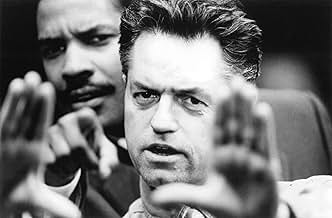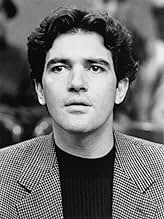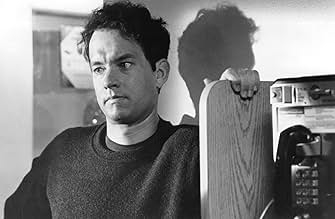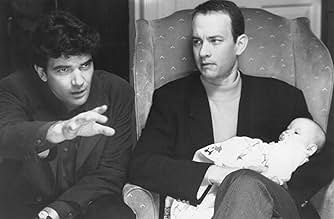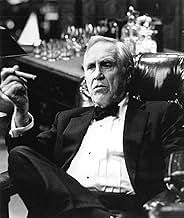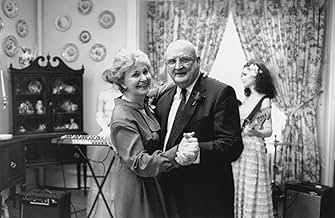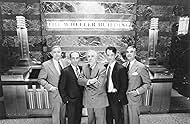Wenn ein Mann mit HIV von seiner Anwaltskanzlei wegen seines Zustands entlassen wird, stellt er einen homophoben Anwalt in kleiner Zeit als einzigen willigen Anwalt für eine rechtswidrige Kü... Alles lesenWenn ein Mann mit HIV von seiner Anwaltskanzlei wegen seines Zustands entlassen wird, stellt er einen homophoben Anwalt in kleiner Zeit als einzigen willigen Anwalt für eine rechtswidrige Kündigung ein.Wenn ein Mann mit HIV von seiner Anwaltskanzlei wegen seines Zustands entlassen wird, stellt er einen homophoben Anwalt in kleiner Zeit als einzigen willigen Anwalt für eine rechtswidrige Kündigung ein.
- 2 Oscars gewonnen
- 20 Gewinne & 23 Nominierungen insgesamt
- Rachel Smilow
- (as Stephanie Roth)
Empfohlene Bewertungen
Tom Hanks stars as Andrew Beckett, a hot-shot lawyer at one of the top law firms in Philadelphia. Despite having just been made an associate (a reward for excellent service), he suddenly finds himself fired. The firm uses an excuse--blaming a mistake he supposedly made on one recent case. But this would not account for the firing and he appears to have been fired because he's ill...suffering from AIDS. Beckett has a hard time finding a lawyer to take a wrongful termination case for him and he's too sick to do this alone. Eventually, he finds a rather homophobic lawyer (Denzel Washington) to take the case...and the second half of the film is the courtroom battle to bring justice to Andrew.
Unlike many films, this one was filmed sequentially. This was important to do because Tom Hanks starved himself and as the movie progresses, his weight loss and excellent make up made it appear as if he was suffering the progressive effects of the disease. Hanks truly put himself out for this role...and it's among the best things he's ever done. Apart from that, it's a well made film...worth seeing and very touching. It's also fascinating to watch to see how far thinking has come regarding gay people and HIV/AIDS.
TriStar certainly provided the funds to attract an all-star cast. Tom Hanks portrays brilliant lawyer Andrew Beckett. When Beckett is fired from his high-prestige law firm, no lawyer wants to touch his case for wrongful dismissal. Denzel Washington plays Joe Miller, who agrees to represent Beckett. (Joe is himself uncomfortable with AIDS. However, he knows injustice when he sees it.) Antonio Banderas plays Beckett's loving partner, Miguel Alvarez. Jason Robards is perfectly cast as Charles Wheeler, Beckett's mentor until he becomes Beckett's enemy. All four men are superstars, and it's easy to see why.
The film doesn't just have star power in the leading roles. Great actors like Roberta Maxwell and Joanne Woodward have small supporting roles.
The movie is courageous in facing AIDS directly. In the 1980's and 1990's, people distinguished between "good AIDS" and "bad AIDS." Good AIDS was AIDS that people contracted from blood transfusions. So, the thought was that these people were innocent victims.
Bad AIDS came from (mostly) men having sex with men. In retrospect, we can see the moral error in this good vs. Evil judgment. But, at the time, gay sex was considered evil, and many people thought that gay men with AIDS deserved the disease.
How this prejudice played out inside and outside the courtroom represents the plot of the movie. It's very strong and truly heart-wrenching.
We saw this film at the excellent Dryden Theatre at George Eastman Museum in Rochester, NY. It was shown at Rochester's wonderful ImageOut, the LGBT Film Festival. Almost all of the movies shown at ImageOut are new, cutting-edge films. Philadelphia was shown under the heading, "ImageOut of the Archives." The movie was made almost 25 years ago, and it's being shown again to mark that anniversary.
Philadelphia is an important film, and shouldn't be missed. It will work very well on the small screen. Find it and watch it. (Or, as I did, watch it again.)
P. S. Mary Steenburgen has a supporting role as Belinda Conine, the attorney representing Beckett's former law firm. I can't remember when an actor has made so strong an impression in a relatively small role. She's just what you'd expect in this context--brilliant, eloquent, with a heart that has no room for conscience or remorse. She knows that the law firm had dismissed Beckett because he had AIDS. However, that's not going to stop her in the least. It's not even going to slow her down.
AIDS is a reality and homophobia is a nasty truth that permeates our "United" States of America, as well as the rest of the world. At the time that this film was released (about 1993), the U.S. found solace in the idea that AIDS and homosexuality were dirty brothers in a distant family. By placing the film in the "City of Brotherly Love", hiring Bruce Springsteen to sing the title song and having an up-and-coming Tom Hanks star, director Jonathan Demme wisely readied an ignorant America for our first, uninhibited glance into the face of AIDS.
Tom Hanks embodied his role in an Oscar-worthy performance, allowing us to watch as his lovely and lively Andrew Beckett deteriorate before our eyes. Tom Hanks and the writers took to task the difficult and annoyingly controversial hurdle of playing the "gay" character and placing the "straight" audience into that different world. Stereotypes are mostly shied away from in the script with a few "fem" gays and drag queens. These scenes are few, but are also a reality. Many a Christmas party have I attended with the same crowd ("fems" and drag queens) in the mix. The other, mildly annoying, factor in this film is that the writers inform us that squeaky-clean gay Andrew Beckett contracts AIDS at a porn theater from an anonymous stranger, while in a committed relationship. This annoyed me because I wanted a righteous victim, not a impure victim. Yet as time has gone by and I have had the opportunity to work with many a victim of AIDS, whether be it male or female, gay or straight, I have seen that this too is an unfortunate reality. No one is perfect (gay or straight, male or female) and mistakes are often made. Costly mistakes are often made. This was a painful truth, but it is a truth nonetheless. In this, Tom Hanks as Mr. Beckett, brilliantly gave AIDS an honest face for a distant America.
Denzel Washington, on the other hand, allowed America to have a relatable character, one whose shoes we've fit in before. Denzel's views of homosexuality were (and still are) commonplace in the American psyche and his reactions to AIDS were understandable to the average audience. Yet all in all this dramatic film brought a message home.
Demme's directing style is nothing amazing; he tastefully weaves a tale without flashy shots or fancy cuts. At times the film borders on preachy, but, as always, it is Demme's story that grasps the audience, his mood that sets us into the tale, his actors and his direction of them that gives the film honesty. This film is highly recommended if not for the great acting but for lovers of a great story.
Wusstest du schon
- WissenswertesThe moment when Mary Steenburgen's character says that she hates the case was improvised in the moment, when the actress expressed her hate towards her role after shooting the mirror scene and Jonathan Demme encouraged her to incorporate it into the role, so the woman would seem more human.
- PatzerThe court stenographer doesn't seem to be actually typing, and the paper tape recording her keystrokes doesn't ever advance.
- Zitate
Joe Miller: Have you ever felt discriminated against at Wyatt Wheeler?
Anthea Burton: Well, yes.
Joe Miller: In what way?
Anthea Burton: Well, Mr. Wheeler's secretary, Lydia, said that Mr. Wheeler had a problem with my earrings.
Joe Miller: Really?
Anthea Burton: Apparently Mr. Wheeler felt that they were too..."Ethnic" is the word she used. And she told me that he said that he would like it if I wore something a little less garish, a little smaller, and more "American."
Joe Miller: What'd you say?
Anthea Burton: I said my earrings are American. They're African-American.
- Crazy Credits"This motion picture was inspired in part by Geoffrey Bowers' AIDS discrimination lawsuit, the courage and love of the Angius family and the struggles of the many others who, along with their loved ones, have experienced discrimination because of AIDS."
- Alternative VersionenThe cable and network television versions of Philadelphia edit out portions of the pharmacy scene where a gay University of Pennsylvania law student attempts to pick up Joe Miller. These two versions end this scene with the law student responding "Do I?" to Joe Miller's question concerning whether Miller looked gay. In the theatrical, home video and premium channel versions, Joe Miller continues to berate the law student with bigot remarks regarding homosexuals.
- VerbindungenEdited into Die Geschichte des erotischen Films (2004)
- SoundtracksStreets Of Philadelphia
Produced by Bruce Springsteen and Chuck Plotkin
Written and Performed by Bruce Springsteen
Courtesy of Columbia Records
Top-Auswahl
- How long is Philadelphia?Powered by Alexa
- What is Philadelphia about?
- How does the movie end?
- Is this film based on a true story?
Details
- Erscheinungsdatum
- Herkunftsland
- Sprache
- Auch bekannt als
- Filadelfia
- Drehorte
- Produktionsfirmen
- Weitere beteiligte Unternehmen bei IMDbPro anzeigen
Box Office
- Budget
- 26.000.000 $ (geschätzt)
- Bruttoertrag in den USA und Kanada
- 77.446.440 $
- Eröffnungswochenende in den USA und in Kanada
- 143.433 $
- 26. Dez. 1993
- Weltweiter Bruttoertrag
- 206.678.440 $
- Laufzeit2 Stunden 5 Minuten
- Farbe
- Sound-Mix
- Seitenverhältnis
- 1.85 : 1
Zu dieser Seite beitragen







